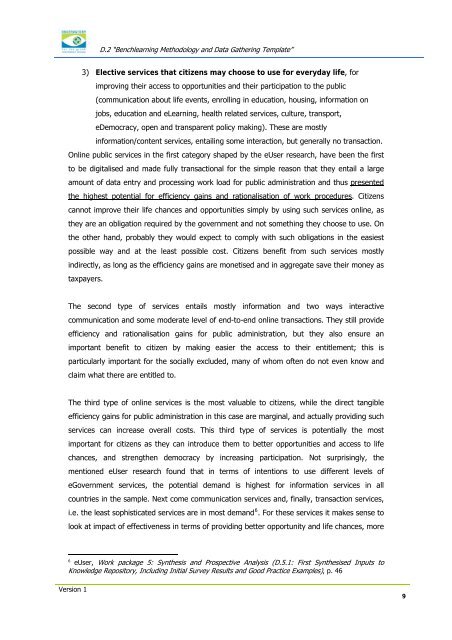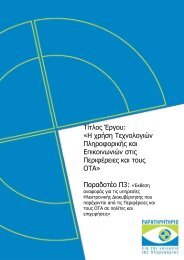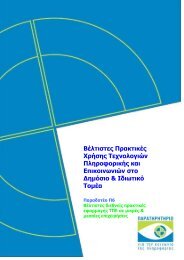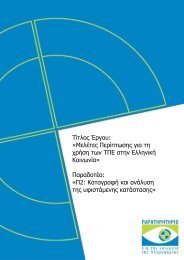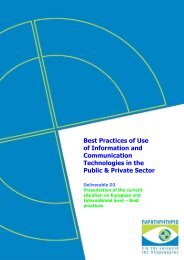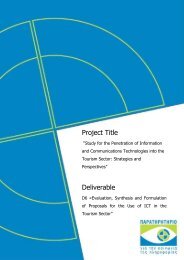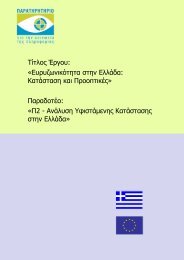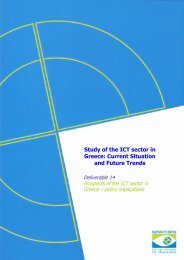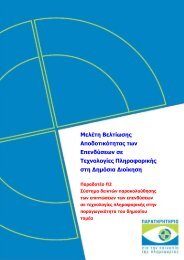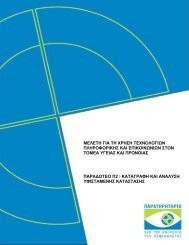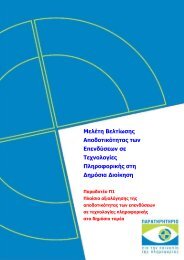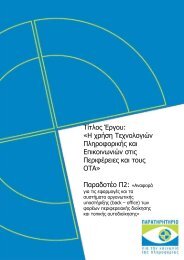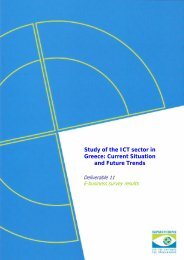Benchlearning methodology and data gathering template
Benchlearning methodology and data gathering template
Benchlearning methodology and data gathering template
- No tags were found...
You also want an ePaper? Increase the reach of your titles
YUMPU automatically turns print PDFs into web optimized ePapers that Google loves.
D.2 “<strong>Benchlearning</strong> Methodology <strong>and</strong> Data Gathering Template”3) Elective services that citizens may choose to use for everyday life, forimproving their access to opportunities <strong>and</strong> their participation to the public(communication about life events, enrolling in education, housing, information onjobs, education <strong>and</strong> eLearning, health related services, culture, transport,eDemocracy, open <strong>and</strong> transparent policy making). These are mostlyinformation/content services, entailing some interaction, but generally no transaction.Online public services in the first category shaped by the eUser research, have been the firstto be digitalised <strong>and</strong> made fully transactional for the simple reason that they entail a largeamount of <strong>data</strong> entry <strong>and</strong> processing work load for public administration <strong>and</strong> thus presentedthe highest potential for efficiency gains <strong>and</strong> rationalisation of work procedures. Citizenscannot improve their life chances <strong>and</strong> opportunities simply by using such services online, asthey are an obligation required by the government <strong>and</strong> not something they choose to use. Onthe other h<strong>and</strong>, probably they would expect to comply with such obligations in the easiestpossible way <strong>and</strong> at the least possible cost. Citizens benefit from such services mostlyindirectly, as long as the efficiency gains are monetised <strong>and</strong> in aggregate save their money astaxpayers.The second type of services entails mostly information <strong>and</strong> two ways interactivecommunication <strong>and</strong> some moderate level of end-to-end online transactions. They still provideefficiency <strong>and</strong> rationalisation gains for public administration, but they also ensure animportant benefit to citizen by making easier the access to their entitlement; this isparticularly important for the socially excluded, many of whom often do not even know <strong>and</strong>claim what there are entitled to.The third type of online services is the most valuable to citizens, while the direct tangibleefficiency gains for public administration in this case are marginal, <strong>and</strong> actually providing suchservices can increase overall costs. This third type of services is potentially the mostimportant for citizens as they can introduce them to better opportunities <strong>and</strong> access to lifechances, <strong>and</strong> strengthen democracy by increasing participation. Not surprisingly, thementioned eUser research found that in terms of intentions to use different levels ofeGovernment services, the potential dem<strong>and</strong> is highest for information services in allcountries in the sample. Next come communication services <strong>and</strong>, finally, transaction services,i.e. the least sophisticated services are in most dem<strong>and</strong> 6 . For these services it makes sense tolook at impact of effectiveness in terms of providing better opportunity <strong>and</strong> life chances, more6eUser, Work package 5: Synthesis <strong>and</strong> Prospective Analysis (D.5.1: First Synthesised Inputs toKnowledge Repository, Including Initial Survey Results <strong>and</strong> Good Practice Examples), p. 46Version 19


